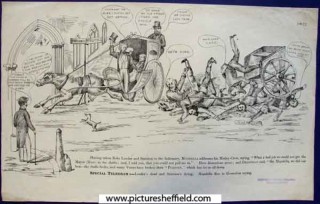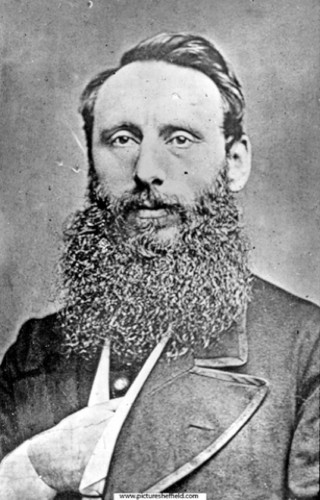Rev. R. Stainton's Political Life ~ Part 1a
Sheffield Independent; Weekly Supplement to Sheffield Telegraph, 1868; Sheffield Times, 1869
Researched & Transcribed by Niv C.
When Mr. Stainton first came to Sheffield of his work outside that of a minister of the Gospel one need say little, but he was indefatigable with temperance and took prominent part in politics, asked by the working men of the town, who had great confidence in him, to introduce Mr A. J. Mundella to stand as Parliamentary candidate for Sheffield, went to Nottingham for that purpose, and bought Mr Mundella to Mr Robert Leader’s home at Commonside to address his first meeting in Sheffield. Hence, assisted materially in the return of Mr. Mundella at the election in 1868.
He gave his reasons for participation in politics at a social meeting, over which Mr Daniel Doncaster presided, and said that he contended that is those critical times it was the duty of every Nonconformist to remember his ancestors and what they had striven and died for, and to carry on themselves in the work which those ancestors had been unable to finish.
Of latter years, however, he does not seem to have been so prominent, either in the political world, or amongst that class of persons called “political dissenters”, that is those by whom the Liberation Society is mainly supported. The aim of Mr. Stainton seems to be to follow more closely in the footsteps of him who came to promote “peace on earth, good will to men,” and to devote his time and talents more towards preaching the Gospel of Jesus Christ, than to polemical strife and religious warfare.
The above paragraph outlines all the commendable ministerial and philanthropy work that Rev. Stainton was involved in, and also hints on being unpretentiously drawn into the world of politics.
Also prominent in the settlement of affairs following the trades outrages in 1867-1869 he called and addressed several large meetings in Paradise Square, the attendance at two of these being estimated in both local newspapers as 15,000 and 12,000. Below, is his letter to the Editor of the Sheffield Independent to publish an open invite for Open Air lectures for the working people and subsequently an article published of his extended view on the relationship of masters and the working classes/ labour.
Open Air Lectures
To the Working People- Dear Friends- Allow me to draw your attention to the lectured delivered in Paradise Square, on Sunday afternoons, the first of which is advertised for tomorrow. Fine weather seems to have set in, and an hour spent in the will be much more pleasant than being shut up in a crammed house, with a dense and foul atmosphere. I have announced the lectures this season for three o’ clock, so that the church bells may have done ringing, and all may be quiet. And as there can be little or no seat accommodation, we will endeavour to confine the whole service to one hour. You will see that all the six lectures are connected with each other, and consecutively arranged; which, together with the vital importance of the subjects, justifies me in asking you to make an effort to hear them all. As Paradise square is large, let me invite you to come in large numbers. Almost the same amount of effort is needed to speak to five thousand as is required for ten; I shall be glad therefore to find not less than ten thousand in the Square on Sunday afternoon, all well, and the weather permitting. Let the married men bring their wives with them, the walk there will do good; and I trust that under the blessing of God the lectures may do good also. – Very truly yours, R. Stainton- April 3, 1868
The Rev. R. Stainton on Trades Unions
Last evening a lecture was given by the Rev. R. Stainton, in the Temperence Hall, Sheffield, on “Trades Unions Meetings and the Public Press, with cogitations on the recent Resurrection and Night Adventures of May Ann. The chair was occupied by Mr. Langley. There was a very large attendance. Mr. Stainton commenced his address by remarking that in consequence of what Mr. Roebuck had said on Monday night it was his purpose to take a wider view of the subject than he originally intended. In his opinion there was never a in our country’s history when the question of capital and labour- or master and servant- was of such vital importance. (Hear-hear) They had heard one side of the question and he would try that night to give them the other if possible. (Cheers.) The causes of “unrest” and anxiety to arrive at an amicable settlement of the question was many, not the least of which were an improved education among the artisan class and the influence of well-conducted penny press. (Hear, Hear) By these means the working men were able to understand and appreciate the law of supply and demand, therefore it was impossible to treat them now as heretofore. (Hear, hear) He maintained that the time had come when the upper ten thousand or the middle class could pass things as they used to do. (Hear, hear) This intelligence on the part of the artisan was a source of anxiety to the masters; but he contended that a kind employer would gain the affection of his servants, and in the support of this statement he instanced the case of two large firms at Halifax and Nottingham where on no occasion was there disturbance or misunderstanding. Referring to what Mr. Roebuck said about the risk which capitalists run, Mr. Stainton said he felt much grieved that nothing was said about the risk of the working men. (Cheers.) Had they no risk from the breaking of grindstones, which maimed them from life-(cheers)- and were they not open to innumerable casualties? This was perfectly clear, consequently it was idle to talk of the risks of the capitalists. It was often said that the trades union were established for the purpose of defiance; but they might just as well say that England’s armaments were kept up for the purpose of defying other nations. Everybody knew that this was not so; it was simply for defence. Then what was right in a nation could not be wrong in a citizen. (Cheers.) Lord Derby had said that he was not opponent of trade unions confined to their legitimate objects; and that they were useful and salutary methods of obtaining the rights of the labouring classes. Why? Then, seek to destroy them? (Hear, hear.) Passing onto the question of strikes, he said there was much to be said for and against them. (Hear, hear.) He took the position that they were right, but notwithstanding this they were inconvenient, and it would be far better if they did not occur. (Hear, hear.) A man had a perfect right to take his labour to the best market, but at the same time he had no right to coerce others. (Hear, hear.) Mr. Roebuck had said something about such persons making themselves liable to be indicted for conspiracy-(laughter)-but this was at variance with the utterance of Lord Derby at the Ministerial banquet held at Manchester in October last. His lordship said “ Forty-three years ago I was the member of the committee of the House of Commons which first recommended and succeeded in carrying the abolition of these laws which made it illegal for working men to combine together to agree not to work under a certain amount of wages.” From this it appeared there had been such a law, but according to the premier it was abolished forty-three years ago. The question then resolved into this: twenty men if they feel they have a grievance have a right to strike, but they have no right to compel the twenty-first against his will to go with them. (Hear, hear.) If strikes were to take place the must be purely voluntary. (Hear, hear.) In alluding to the causes which lead to strikes, the lecturer remarked that not the least was the arbitrary conduct on the part of managers, who, in many instances, require “sweets” or a bribe otherwise they vented their spleen on the working men. But there were hundreds of men who would sacrifice every interest rather than lose their independence. (Cheers.) In his opinion there would be fewer disputes between master and servant if the managers had not supreme power, and if the complaints could be carried to the fountain head with the intervention of a third party, who oftentimes misrepresented the facts. (Great cheering.) Glancing at the exasperation manifested towards Mr. Roebuck on Monday night, Mr. Stainton maintained that this exhibition of feeling would not have been manifested had he given the other side also-(cheers)- and he was never more surprised in his life than when the Hon. member concluded his lecture without any reference to it. In conclusion, Mr. Stainton briefly alluded to the resuscitation of “Mary Ann”, and the right of the press to be present at the meetings of trades unions. He strongly condemned the former, and expressed a hope that rattening would cease from the present time. (Hear, Hear.) The press he said had not the right to enter the private meetings connected with trades unions. (Cheers.) It was true that when a society laid themselves open, as some had done, a good deal might be said in favour of publicity, but as a right the press had no business to demand admittance. (Cheers.)
On the proposition of Mr. Dronfield, seconded by Mr. Austin, it was resolved, “That this meeting tenders its sincere and hearty thanks to the Rev. R. Stainton, not only for his address this evening but also for the manliness he displayed in expressing his opinions on trades unions and the Commission of Inquiry, as well as for his exertions in promoting any movement either for elevating or ameliorating the condition of the working classes.”
He also found time to interest himself in the comfort of the cabdrivers, and raised a sum of over £100 by which the first cab shelter Sheffield ever knew was erected and furnished in Glossop Road at the foot of Northumberland. In that work he was splendidly supported by Mr William Cobby, of Broomhill. The shelter was run by the cabmen themselves; they had their own committee, kept their own funds with Mrs Stainton as their treasurer, and – paid their way. Many cabdrivers in Sheffield remember what that shelter meant to them in the long winter months, and remembers also that this private enterprise was followed by the Corporation in many parts of the town.
Years before he came to Sheffield as a minister at Garden Street, Mr Stainton was an indefatigable missioner, and in company with Dr Rutherford, of Newcastle, a gentleman who died some few years ago full of honours, he passed through Lancashire, speaking in every town and almost every village, and so reaching Chester, where the authorities arrested both for brawling, and they were confined in the Castle. He was possessor of a baritone voice of rich quality and, in these missions as well as at his Sunday afternoon services in Sheffield, used this freely in the singing of solos. His was one of the best known figures in the town, his popularity with the working classes was unbounded, and to thousands of them he was just “Bobby” Stainton, a friend – and very often a friend in need. In 1871 Mr Stainton was one of a deputation of three appointed to interview Mr W. E. Gladstone at the House of Commons with regard to the question of religious teaching in the schools, the others being the Rev. Samuel Earnshaw and the Rev J. Hargreaves. This came after a conference in Sheffield of clergymen and ministers of all denominations.
A little later the glass blowers of Castleford approached him in their dispute with their employers, and at their request he acted as arbitrator with satisfactory results. The employees, through a deputation, afterwards sent to Mrs Stainton a very beautifully moulded glass teapot in token of their appreciation.
References:
- British Newspaper Archives; Sheffield Independent, 4th April, 1868; Weekly Supplement to Sheffield Telegraph, February 1, 1868; Sheffield Times, November 30, 1869
- Mrs. Jennifer Clark, Brisbane, Australia
- Sheffield Portrait Gallery











No Comments
Add a comment about this page